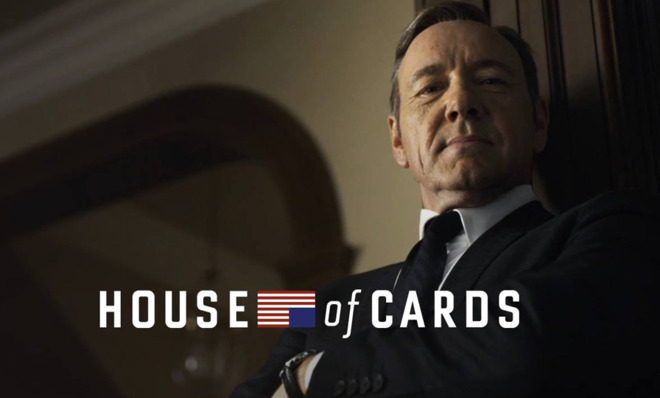The empty cynicism of House of Cards
The Netflix drama's second season doubles down on the show's relentlessly grim vision of American politics


A free daily email with the biggest news stories of the day – and the best features from TheWeek.com
You are now subscribed
Your newsletter sign-up was successful
It's weirdly appropriate that House of Cards' second season — which arrived in the wee hours of Feb. 14 and was ravenously consumed by many viewers over the holiday weekend — came sandwiched between Valentine's Day and President's Day. This is a series with a staggeringly cynical view of both romantic relationships and the American presidency, and anyone who was skeptical about either of them probably needed the outlet.
And that's just the beginning of the self-satisfied lessons House of Cards aims to impart. It's rare that a show is simultaneously humorless and downright silly, but House of Cards continues to find a way. This is, after all, a series centered on a heavily scrutinized politician who has personally committed murder. While some of the show's contrivances are more insidious and offensive than others — like, say, the tossed-off assertion that all female reporters sleep with sources — it owes no more debt to reality than any other fictional story.
But on a thematic level, the success of House of Cards says something important about American attitudes about politics. Until recently, the most popular show about politics was The West Wing, which promised audiences Jed Bartlet, "a president we can all agree on." House of Cards is the first real challenger to The West Wing's monopoly on the Oval Office, and its protagonist Frank Underwood offers a starkly different moral: "Democracy is so overrated."
The Week
Escape your echo chamber. Get the facts behind the news, plus analysis from multiple perspectives.

Sign up for The Week's Free Newsletters
From our morning news briefing to a weekly Good News Newsletter, get the best of The Week delivered directly to your inbox.
From our morning news briefing to a weekly Good News Newsletter, get the best of The Week delivered directly to your inbox.
The West Wing, like House of Cards, offers a vision of American politics that is more fanciful than plausible. (HBO's ongoing Veep — which features all of House of Cards' egomaniacal squabbling and none of its implausibly grand conspiracies — is more accurate than either of them.) But The West Wing didn't face much competition in its heyday, while House of Cards has bested shows like Scandal, Alpha House, and Political Animals to define itself as the political show for its era.
It's not hard to figure out why. In November, Congress' approval rating hit an all-time low of 9 percent. Given most people's dim appraisal of contemporary politics, is it any surprise that audiences have embraced a series that depicts politicians — without exception — as either hopelessly ineffectual or psychopathically corrupt? There's an undeniable seductiveness to the show's narrative, even if that narrative is built on a philosophy that's both nasty and flimsy.
Yes, showrunner Beau Willimon worked on campaigns for Hillary Clinton, Bill Bradley, and Howard Dean before launching his writing career with the play Farragut North (which was later adapted into the star-studded 2011 thriller The Ides of March). For his part, Willimon seems to believe what he's selling; in interviews, he's generally as cynical as the dialogue he writes. "All relationships are transactional. Even love. Love might be the most transactional relationship of all," said Willimon in a recent interview with The New York Times — a line that could easily have come straight from one of Frank Underwood's glib soliloquies.
But all that cynicism adds up to a lot of empty calories. Just as optimism and straw-manning turned The West Wing into a simplistic (if engaging) fantasyland for viewers who wanted to believe in the American presidency, cynicism prevents House of Cards from saying anything truly insightful or challenging about our politics. Instead, the show confirms the biases of an audience that has long since grown skeptical of a Congress mired in infighting. There are no shades in House of Cards' gray; instead, the show is merely content to reassure viewers that everything really is as bad as they think it is.
A free daily email with the biggest news stories of the day – and the best features from TheWeek.com
It's a story that's born from our time. It's just too bad it doesn't have more to say about it.
Scott Meslow is the entertainment editor for TheWeek.com. He has written about film and television at publications including The Atlantic, POLITICO Magazine, and Vulture.
-
 Political cartoons for February 16
Political cartoons for February 16Cartoons Monday’s political cartoons include President's Day, a valentine from the Epstein files, and more
-
 Regent Hong Kong: a tranquil haven with a prime waterfront spot
Regent Hong Kong: a tranquil haven with a prime waterfront spotThe Week Recommends The trendy hotel recently underwent an extensive two-year revamp
-
 The problem with diagnosing profound autism
The problem with diagnosing profound autismThe Explainer Experts are reconsidering the idea of autism as a spectrum, which could impact diagnoses and policy making for the condition
